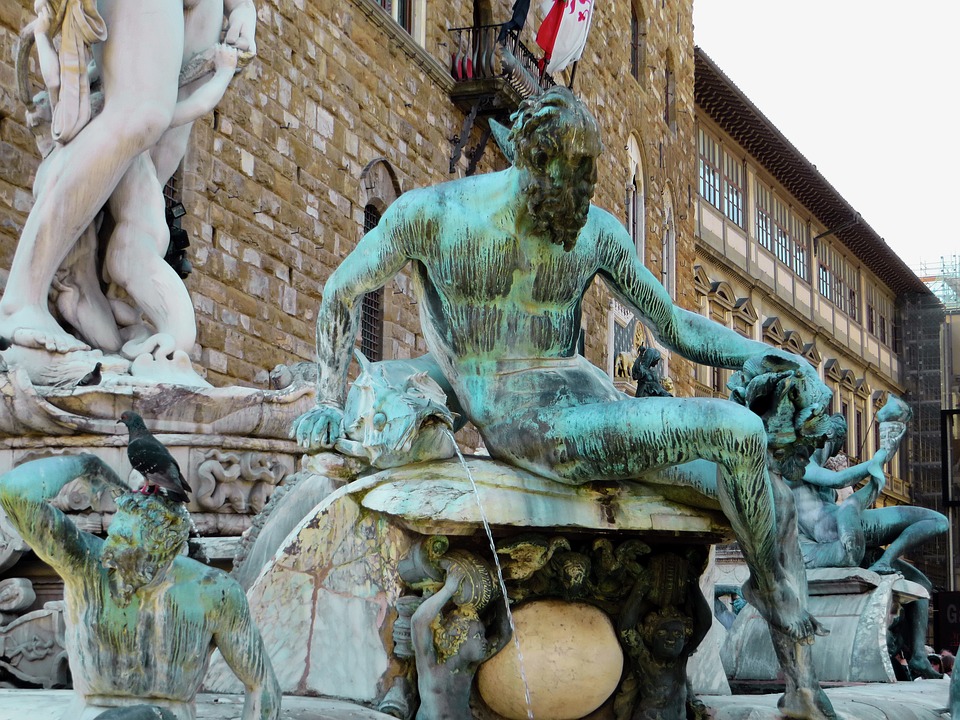back

The Fountain of Neptune (Italian: Fontana del Nettuno) is a fountain in Florence, Italy, situated on the Piazza della Signoria (Signoria square), in front of the Palazzo Vecchio. Made of marble and bronze, the fountain was commissioned in 1565 and designed by Baccio Bandinelli. It is the work of the sculptor Bartolomeo Ammannati with some elements created by collaborators. For example, the bronze sea-horses are the work of Giovanni da Bologna, often called Giambologna.
In 1559, Cosimo I de' Medici launched a competition to design a fountain at a time when a new aqueduct was also being built, the first to bring running water to the city. The plan was for a statue of Neptune as the primary element, in a chariot drawn by sea-horses, symbolizing Florence's command of the Mediterranean. Initially, Baccio Bandinelli was the sculptor chosen but he died before work began. Sculptor Ammannati was hired to take over and completed the work with assistants and collaborators. The face of Neptune is said to resemble that of the Grand Duke Cosimo.
The 4.2 meter tall Neptune figure, made of Apuan marble, was completed in 1565 in time for the wedding of Francesco de' Medici I to grand duchess Johanna of Austria. Florentines were not impressed and called the statue "Il Biancone" ("the white giant"). The work on the basin and other aspects of the fountain required nearly ten years. Ammannati and his collaborators added around the perimeter of the basin in a mannerist style, reclining, bronze river gods, laughing satyrs and marble sea-horses emerging from the water. The pedestal on which the statue stands is in the center of the octagonal fountain. It is decorated with the mythical figures of Scylla and Charybdis. The final work was completed in December 1574. The statue on display today is a copy made in the 1800s when the original was moved to the National Museum.
The fountain has suffered a great deal of damage during the centuries. It was used as a washbasin for inkpots and laundry at the end of the 16th century. It was vandalized on January 25, 1580. A satyr was stolen during the carnival in 1830. It was damaged again by the Bourbon bombardments of 1848. Subsequently, it has been the object of several restorations and substitutions.
On August 4, 2005, the statue was the target of three vandals who climbed it, damaging one of the hands and the trident of Neptune. The act was recorded by security cameras. The statue was restored by 2007. Since then, security on the fountain has been taken very seriously. In late 2007, the statue was the target of attempted vandalism by four teens. The security cameras and nearby police ensured that no damage came to the fountain again and the four were arrested.
Although the damage was repaired, the fountain is undergoing a general restoration that started in September 2016 and is expected to conclude in 2018; during this time, the fountain is surrounded by a protective cage and sometimes, by scaffolding.
As would be expected, the Sea-God, Neptune is a frequent theme for fountains, and over a dozen Fountains of Neptune exist. In Florence, there is another fountain of Neptune is found in the Boboli Gardens, behind the Palazzo Pitti in Florence. Giambologna sculpted a similar statue for the similar fountain in Bologna in the 1560s. Giovanni Angelo Montorsoli created a nearly contemporary fountain in Messina, Sicily. The Fountain of Neptune, Rome (Neptune fighting with an octopus) was completed in 1878 when the statue was added by Antonio della Bitta and sea creatures by Gregorio Zappalà for the theme "Nereids with cupids and walruses". The original basin was designed in 1574, by Giacomo Della Porta, and built at about that time.